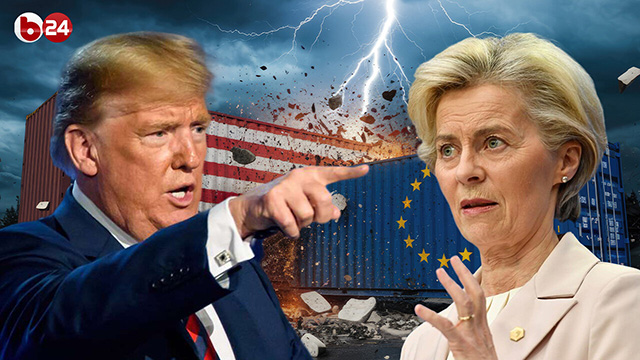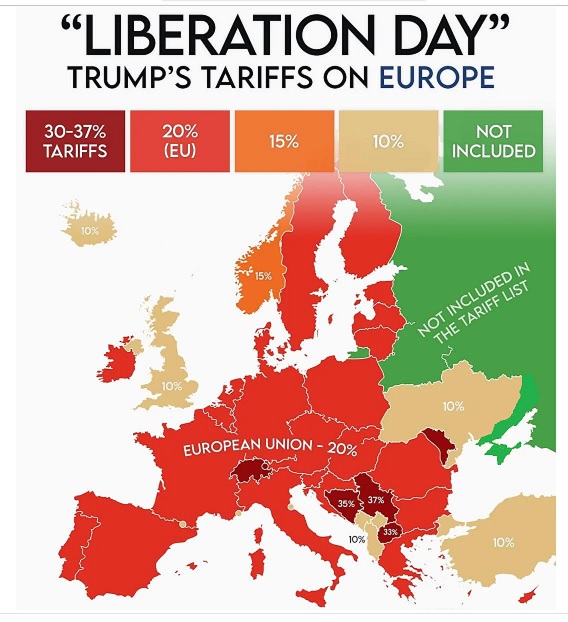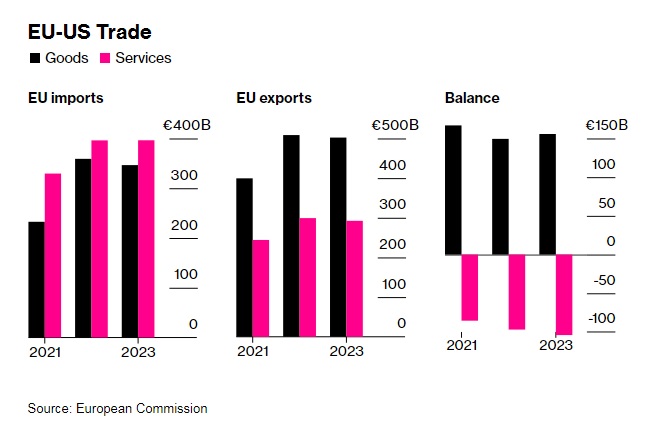
The first step was taken by the European Commission. EU offers Trump removal of all industrial tariffs. “Europe is always ready for a good deal,” says Commission President Ursula von der Leyen, POLITICO quotes.
The EU has offered the United States a “zero-for-zero” tariff scheme, European Commission President Ursula von der Leyen said Monday, seeking to avoid a tit-for-tat trade war.
“We have offered zero-for-zero tariffs for industrial goods as we have successfully done with many other trading partners. Because Europe is always ready for a good deal. So we keep it on the table,” she told a press conference alongside Norwegian Prime Minister Jonas Gahr Støre.
Von der Leyen’s renewed offer comes after Trump last week slapped 20 percent tariffs on the EU and a slew of other trade partners, hiking U.S. trade barriers to their highest in more than a century.
Amid the market turmoil, von der Leyen sought to project calm.
“We stand ready to negotiate with the U.S.,” she said.
Clarifying, EU Trade Commissioner Maroš Šefčovič said separately that the zero-for-zero deal could cover cars and all other industrial goods, such as chemicals, pharmaceuticals, rubber and plastic machinery.
 Pic.: Amazing Maps
Pic.: Amazing Maps
Trump immediately took a counter-move. He dismisses last-gasp EU push to stop tariffs kicking in.
President Donald Trump rejected a European Union proposal to drop tariffs on all bilateral trade in industrial goods with the US, meaning that his 20% tariff on all EU imports is due to come into force Wednesday.
Speaking at the White House on Monday, Trump said the offer from European Commission President Ursula von der Leyen is not enough to reset the transatlantic trading relationship, accusing the EU of maintaining other barriers to trade, Bloomberg informs.
“The European Union has been very bad to us,” he said. “We’re paying them to guard them militarily and they are screwing us on trade, so that’s not a good combination.”
Now, Europeans are struggling to prevent the dispute spinning out of control, with the US singling out the EU and China as two of the main targets of his trade policy.
In his comments on Monday, Trump railed against European trade policy, asserting that the EU has blocked access to US cars and agricultural products, and demanding that European countries buy more energy from the US.
The EU “was formed to really do damage to the US on trade, that’s the reason it was formed,” Trump said, who repeated his complaints that the US has been paying for Europe’s defense since other NATO allies haven’t been spending enough on defense.
Even so, Trump hasn’t been specific about what kind of concessions he’s looking for, and EU officials have struggled to engage with their US counterparts. Von der Leyen has yet to meet with Trump since he took office.
EU Trade Commissioner Maros Sefcovic suggested he’s open to discussing non-tariff issues as the US has demanded, as long as there’s a mutual benefit for both sides. But he said that the value-added tax, which Trump has criticized, is an important source of income for member states and the EU won’t change this system.
U.S. Treasury Secretary Scott Bessent told Bloomberg Television on Monday that he doesn’t expect any deals with countries before the higher tariffs kick in on Wednesday.
 Data: Bloomberg
Data: Bloomberg
The European Union will have to commit to buying $350 billion of American energy to get a reprieve from Donald Trump's sweeping tariffs, the U.S. president said late Monday, dismissing Brussels' offer of "zero-for-zero" tariffs on cars and industrial goods, POLITICO reports.
"We have a deficit with the European Union of $350 billion and it's gonna disappear fast," Trump said. "One of the ways that that can disappear easily and quickly is they're gonna have to buy our energy from us... they can buy it, we can knock off $350 billion in one week. They have to buy and commit to buy a like amount of energy."
On Monday, asked whether his global tariffs were a strong-arm negotiation tactic or permanent, Trump said: "There can be permanent tariffs and there can also be negotiations, because there are things we need beyond tariffs."
He added: "If we can make a really fair deal and a good deal for the United States, not a good deal for others, this is America first. It's now America first."
But he also indicated that he wanted the EU to reduce its standards to allow more U.S. goods to enter its market, referring to safety measures as "non-monetary tariffs."
"It's tariffs where they put things on where they make it impossible for you to sell a car... they make it so difficult, the standards and the tests," Trump said. "They come up with rules and regulations that are just designed for one reason: that you can't sell your product in those countries. And we're not gonna let that happen. Those are called non-monetary barriers."
In an indication of what is driving Trump's actions, the president harked back to a time when U.S. tariffs were sky high.
"You know our country was the strongest from 1870 to 1913," Trump said. "You know why? It was all tariff-based. We had no income tax. Then in 1913, some genius came up with the idea of let's charge the people of our country, not foreign countries that are ripping off our country."
read more in our Telegram-channel https://t.me/The_International_Affairs

 11:41 09.04.2025 •
11:41 09.04.2025 •






















